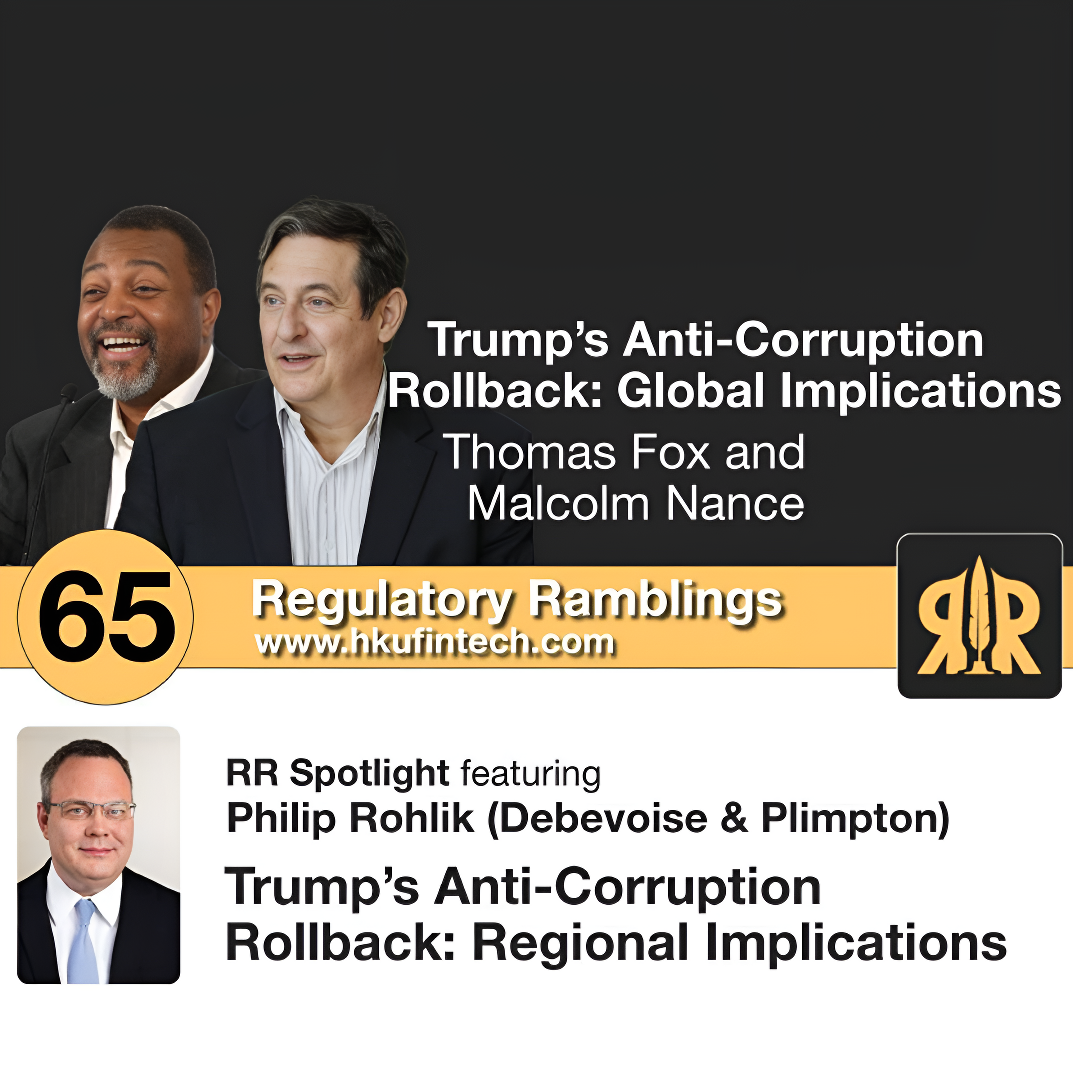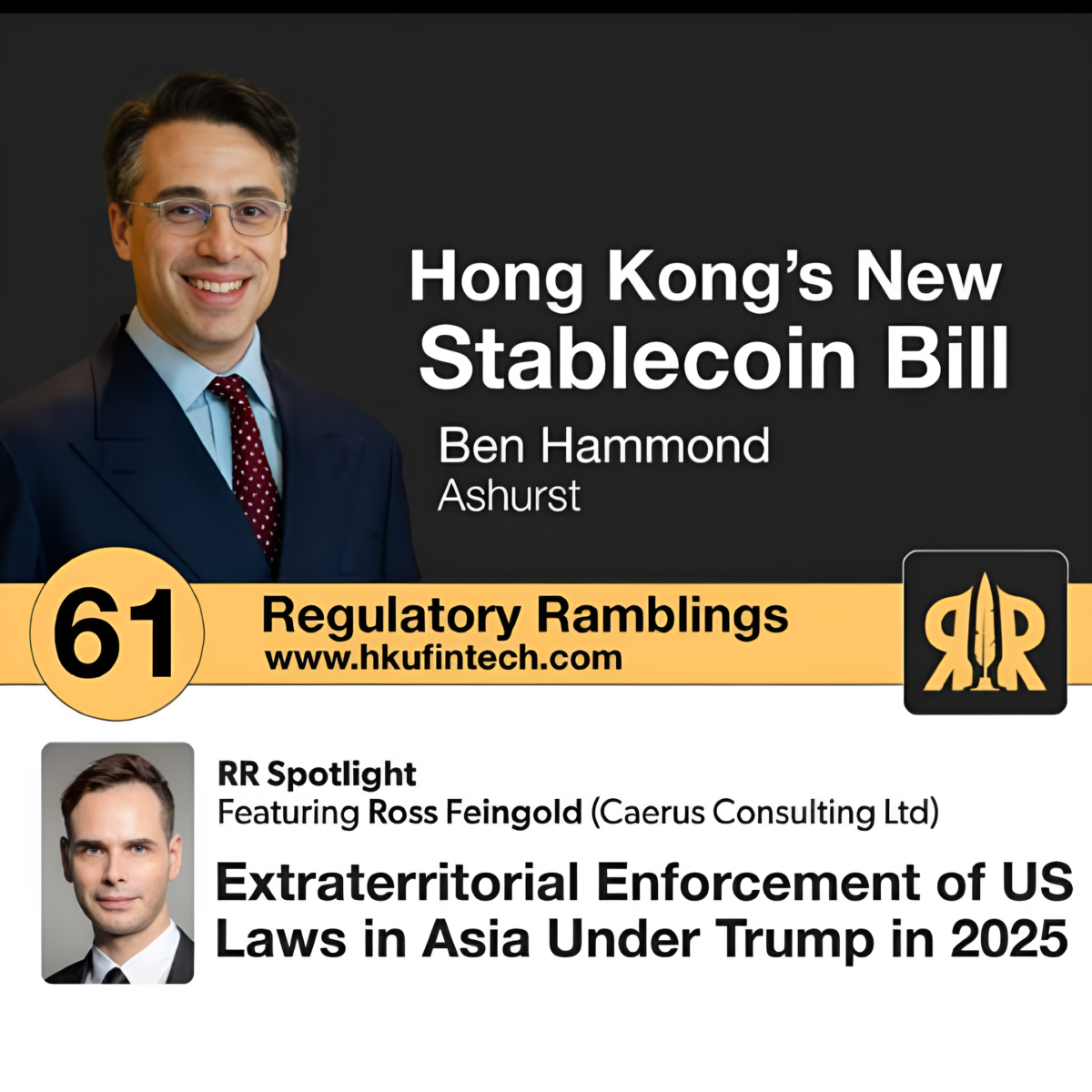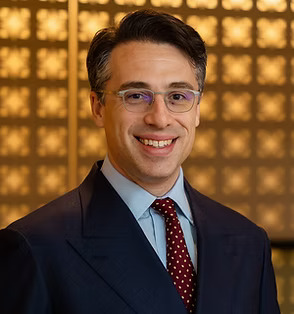This episode discusses the recent executive order signed by US President Donald J. Trump instructing the Department of Justice to halt enforcement of the decades-old, much-dreaded Foreign Corrupt Practices Act (FCPA) pending a one-year review. In our initial “Regulatory Ramblings Spotlight” segment, we speak with Philip Rohlik, an American attorney in mainland China with the law firm Debevoise & Plimpton, to get a sense of what the president’s decision means for Hong Kong and the broader Asia-Pacific.
Following that, we have a longer chat on the global implications of President Trump’s move with Tom Fox, a veteran compliance and anti-corruption lawyer, noted FCPA specialist, and podcaster, and Malcolm Nance, a former US naval intelligence officer, counterterrorism specialist, and author.
Philip Rohlik
 Philip Rohlik is counsel in Debevoise & Plimpton LLP’s Shanghai office. He is a member of the firm’s White Collar & Regulatory Defense and International Dispute Resolution Groups, and his practice focuses on international investigations, securities law, and dispute resolution. He is recognized by “The Legal 500 Asia Pacific—Greater China” (2024-2025) for his anti-corruption and compliance practice and has been described as “very thorough, “hands-on,” and “excellent investigation lawyer.”
Philip Rohlik is counsel in Debevoise & Plimpton LLP’s Shanghai office. He is a member of the firm’s White Collar & Regulatory Defense and International Dispute Resolution Groups, and his practice focuses on international investigations, securities law, and dispute resolution. He is recognized by “The Legal 500 Asia Pacific—Greater China” (2024-2025) for his anti-corruption and compliance practice and has been described as “very thorough, “hands-on,” and “excellent investigation lawyer.”
Based in Asia since 2011, Philip leads the firm’s dispute resolution team in Shanghai. He joined Debevoise in 2000, having received his J.D. Magna Cumlaude from the New York University School of Law that same year. He received a B.A. Summa Cum Laude with honors from St. Louis University in 1997.
Tom Fox
 Tom Fox is based in West Texas and is a prominent member of the compliance community and one of the most well-known legal practitioners regarding the FCPA. Over the past 15 years, he has been a general counsel and chief compliance officer. He is now an independent consultant, assisting companies with anti-corruption, anti-bribery compliance, and international transaction issues.
Tom Fox is based in West Texas and is a prominent member of the compliance community and one of the most well-known legal practitioners regarding the FCPA. Over the past 15 years, he has been a general counsel and chief compliance officer. He is now an independent consultant, assisting companies with anti-corruption, anti-bribery compliance, and international transaction issues.
He is also the author of the award-winning FCPA Compliance and Ethics Blog and the international best-selling book Lessons Learned on Compliance and Ethics. His podcasts have won numerous W3, Davey, Communicator, and Webby awards for podcasting excellence.
Tom is the author of the seminal text “The Compliance Handbook,” now in its 5th edition published by LexisNexis. In addition to his blog and podcast, he is a columnist for “Corporate Compliance Insights” and a contributing editor to the “FCPA Blog.” He is a well-known and frequent speaker on compliance and ethics issues, social media use, and corporate leadership.
Malcolm Nance
 Malcolm Nance is based in upstate New York. He is a 20-year veteran of the US Navy, where he was an intelligence officer, cryptographer, and Russian and Arab language specialist. As a master chief, he was responsible for discipline throughout the ranks.
Malcolm Nance is based in upstate New York. He is a 20-year veteran of the US Navy, where he was an intelligence officer, cryptographer, and Russian and Arab language specialist. As a master chief, he was responsible for discipline throughout the ranks.
He is best known for his appearances on MSNBC, where he warned about Russian interference in the run-up to the 2016 and 2020 US Presidential elections. Malcolm is also a best-selling author, with his books “The Plot to Hack America,” “The Plot to Destroy Democracy,” “The Plot to Betray America,” and most recently “They Want to Kill Americans,” all of which are well worth reading. Given the radical actions of the second Trump administration, his two most recent books seem eerily prescient. You can discover more from Malcolm at his Substack and his “Black Man Spy” podcast on YouTube.
Discussion:
Three weeks after returning to the White House, US President Donald Trump signed an executive order on February 10 directing the Justice Department to pause prosecutions of Americans accused of bribing foreign government officials while trying to win or retain business in their countries.
Trump’s order pauses enforcement of the nearly half-century-old Foreign Corrupt Practices Act (FCPA) and directs Attorney General Pam Bondi to review current and past actions related to the law and prepare new guidelines for enforcement.
The law, enacted in 1977, prohibits companies that operate in the United States from bribing foreign officials. Over time, it has become a guiding force for how American businesses operate overseas.
“It’s going to mean a lot more business for America,” Trump told reporters while signing the order in the Oval Office at the signing.
Interestingly enough, Trump wanted to strike down the FCPA during his first term in office, calling it a “horrible law” and claiming it made the US the subject of the world’s ridicule and derision.
Anti-corruption watchdog Transparency International said the FCPA made the US a world leader in addressing corruption.
Trump’s executive order “minimizes—and could pave the way for eliminating—the crown jewel in the U.S.’s fight against global corruption,” Gary Kalman, executive director of Transparency International US, said in a statement.
The White House factsheet said that in 2024, the Justice Department and the Securities Exchange Commission filed 26 FCPA-related enforcement actions, and by year-end, at least 31 companies were under investigation.
In the initial segment, Philip Rohlik chats with “Regulatory Ramblings” host Ajay Shamdasani about what the Trump administration’s actions will mean for the fight against bribery and corruption in Hong Kong, Greater China, and APAC writ large. They discuss the possibility that with less FCPA enforcement, the UK Bribery Act (2010) might fill the void to some extent, while acknowledging that the British Serious Fraud Office lacks the resources of the USDOJ to make extraterritorial enforcement a reality.
Philip also shares his advice on what he would tell compliance officers and in-house/general counsel at banking or financial institutions or major corporations in Hong Kong, Singapore, or Beijing. Hint: Now is not the time to relax.
We then turn to the longer conversation portion of the broadcast, where we examine some of the more global, macro-level effects of President Trump’s recent executive order.
Tom and Malcolm shared their visceral responses when they first heard the announcement that the administration would halt FCPA enforcement. Tom asks why Trump took so long because he had raised similar concerns during his first term (2017-21).
They share their concerns about what it will mean for the global fight against bribery and corruption while acknowledging the limitations of the UK Bribery Act. Still, mainland China’s anti-corruption legislation is worth considering as well.
The conversation concludes with Malcolm and Tom advising the legal and compliance professionals serving financial firms and multinational corporations in Asia, the Middle East, and the world more generally. They concur that now is not the time to slack off regarding anti-graft efforts.
They conclude that the FCPA is still a powerful tool. Given the current president’s vindictive and transactional nature, we might expect selective enforcement of the Act under his administration. Indeed, given past experience, it might be inevitable.
Regulatory Ramblings podcasts is brought to you by The University of Hong Kong – Reg/Tech Lab, HKU-SCF Fintech Academy, Asia Global Institute, and HKU-edX Professional Certificate in Fintech, with support from the HKU Faculty of Law.
Useful links in this episode:
-
Follow Philip Rohlik on LinkedIn
-
Debevoise & Plimpton LLP: Webpage
-
Follow Tom Fox on LinkedIn
-
Compliance Podcast Network: Webpage
-
Subscribe to Malcolm Nance on Substack
-
Malcolm Nance on Youtube
You might also be interested in:
-
Must have book by Ross Buckley, Douglas Arner & Dirk Zetzsche – FinTech: Finance, Technology & Regulation
-
Building Better Financial Systems: FinTech Sustainability – Research
-
HKU-SCF Fintech Academy – website
-
Asia Global Institute – website
-
Most sought after Fintech course on edX – Introduction to Fintech
Connect with RR Podcast at:
LinkedIn: https://hk.linkedin.com/company/hkufintech
Facebook: https://www.facebook.com/hkufintech.fb/
Instagram: https://www.instagram.com/hkufintech/
Twitter: https://twitter.com/HKUFinTech
Threads: https://www.threads.net/@hkufintech
Website: https://www.hkufintech.com/regulatoryramblings
Connect with the Compliance Podcast Network at:
LinkedIn: https://www.linkedin.com/company/compliance-podcast-network/
Facebook: https://www.facebook.com/compliancepodcastnetwork/
YouTube: https://www.youtube.com/@CompliancePodcastNetwork
Twitter: https://twitter.com/tfoxlaw
Instagram: https://www.instagram.com/voiceofcompliance/
Website: https://compliancepodcastnetwork.net




 Ross Feingold is Head of Research at Caerus Consulting, a consultancy that advises clients on worldwide risk management. Admitted to practice law in New York and Washington, DC, he was previously an in-house counsel at the Royal Bank of Scotland, Deutsche Bank, and J.P. Morgan. Ross has lived in Asia for over twenty years—including in Hong Kong, Singapore, and Taipei—and speaks fluent Mandarin.
Ross Feingold is Head of Research at Caerus Consulting, a consultancy that advises clients on worldwide risk management. Admitted to practice law in New York and Washington, DC, he was previously an in-house counsel at the Royal Bank of Scotland, Deutsche Bank, and J.P. Morgan. Ross has lived in Asia for over twenty years—including in Hong Kong, Singapore, and Taipei—and speaks fluent Mandarin. Ben Hammond is the managing partner of the law firm Ashurst in Hong Kong. In this episode, he articulates his views on the city’s new Stablecoin Bill, which was gazetted on December 6, 2024, and had its first reading before the territory’s Legislative Council on December 18.
Ben Hammond is the managing partner of the law firm Ashurst in Hong Kong. In this episode, he articulates his views on the city’s new Stablecoin Bill, which was gazetted on December 6, 2024, and had its first reading before the territory’s Legislative Council on December 18.